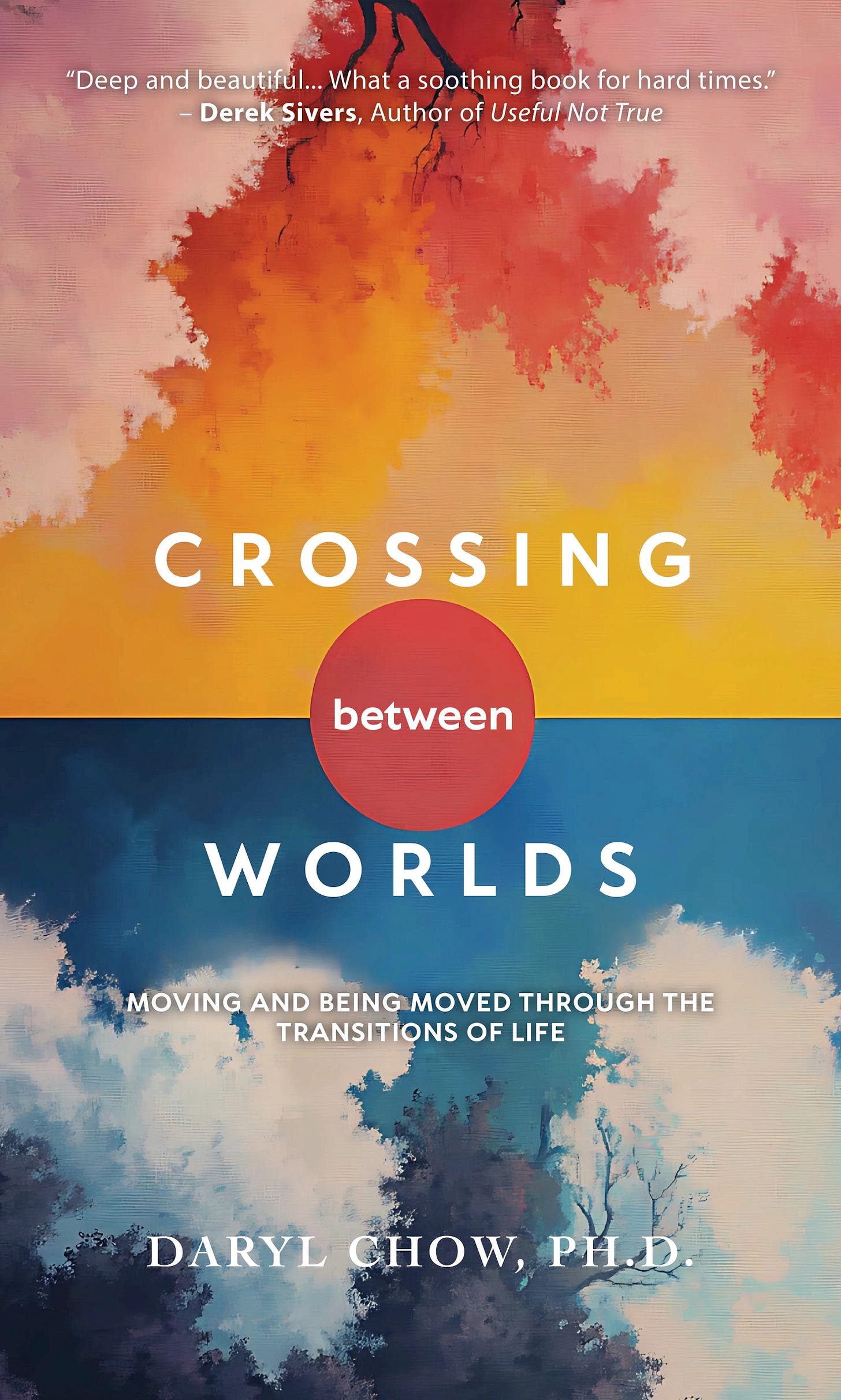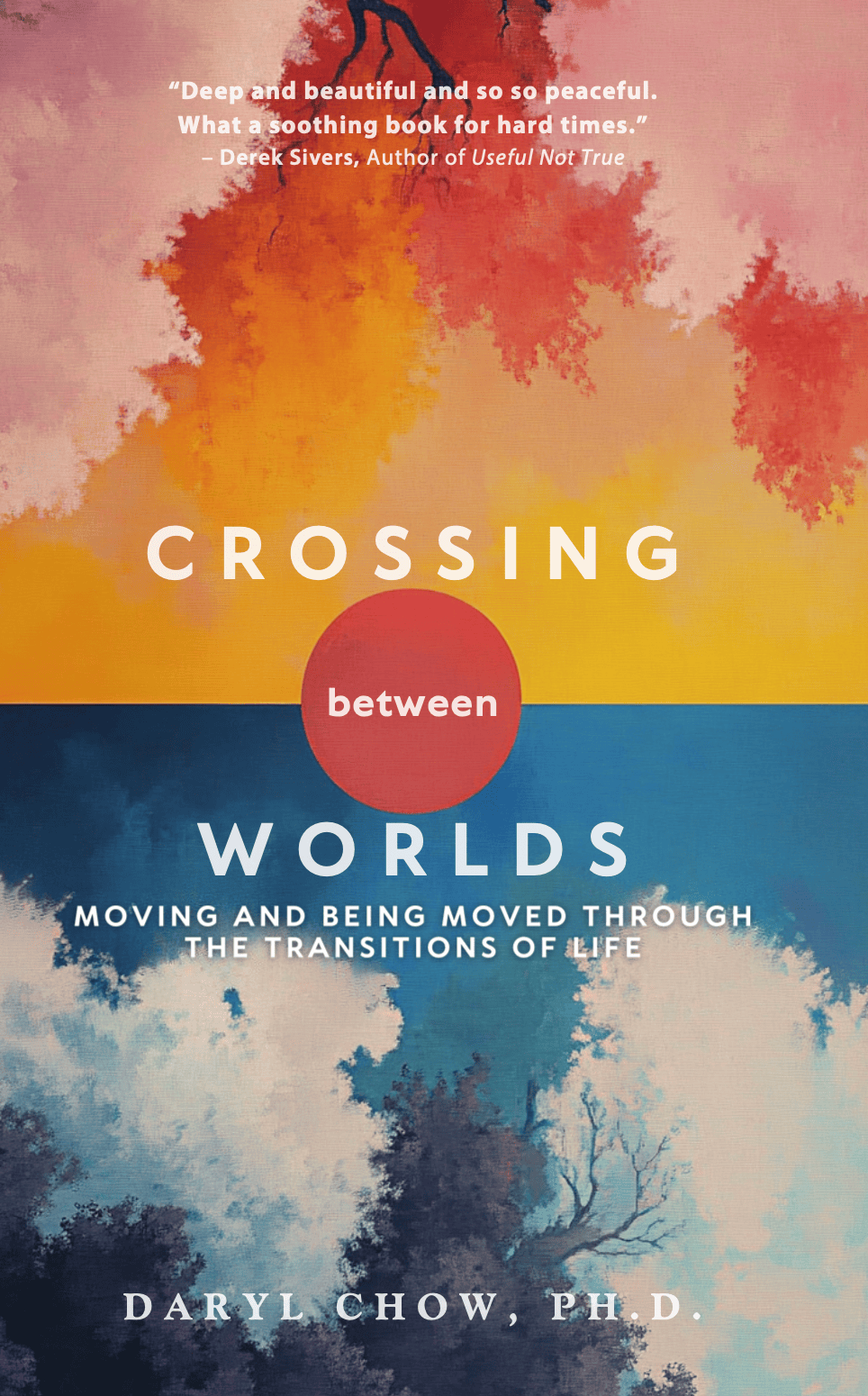Random Currents #214 ⭕️
Crossing Between Worlds out now. And some recent interesting research on ADHD, wellbeing, and differences between therapists.
Crossing Between Worlds is now available.
It’s been more than 3.5 years of working at this manuscript.
I can’t believe it has taken this long, again. It still hasn’t taken any faster after writing previous books. Planning fallacy prevails.
There is a whole bunch of people to thank, including four beta-readers who gave me their inputs at the early conception of the book idea, as well as my life-saving editor, Shawn Mihalik, famed for his work with The Minimalists and his own novels (see Acknowledgements in the book).
Thanks also to the legendary Derek Sivers—one of the great thinkers I greatly admire—for his kind words about the book.
EXCLUSIVE OFFER FOR THE FIRST 50
For the Launch, I am offering THE FIRST 50 an exclusive offer for readers of Full Circles (FC) and Frontiers of Psychotherapists Development (FPD) when you buy direct. (Limited orders left).
Here’s what you will get:
Big 33% discount: You pay USD$23.45 (Full Retail Price: USD$35) for the physical copy. Free shipping.
Buy 1, Gift 1: You also get to gift someone another copy, at no cost to you.
Entirely free access to the ebook and audiobook (narrated not by an AI, but by this 46 year-old Asian-Aussie-some-say-American-accented author).
And why free ebook and audiobook? I don’t believe you should pay for the same content twice, or three times. This helps you save USD$18 + 28 = USD$36.
In case you are wondering, I know, it’s a crazy deal. I’m eager to get the book in your hands, and would love to hear your thoughts about it.
Here’s How:
Email us at admin@darylchow.com.
Title Email: CBW
Provide us your mailing address and nominate a friend whom you’d like to give the second copy to. Tell us why you want to gift this to this particular friend if you wish. We will mail both copies to you.Once we got your email, a payment link will be emailed to you at the discounted rate USD$23.45.
In case you are wondering, why no online store to click and buy the paperback direct? Not yet. Embarrassingly, we are still trying to get that up and running properly.
You can also get the book elsewhere if you wish. Crossing Between Worlds is now available at major stores (Amazon, Barnes & Noble, Bookshop.org).
Or give your support to the local bookstores. Bookstores must prevail!
Here are some special previews to the book, taken from my other Substack, Full Circles: Meditations on the Inner and Outer Life1:
Frontiers Friday #214
This week on Frontiers Friday, I’d share some recent interesting research I’ve stumbled across. I’d distill each of the studies findings (You can read the study if you want more. Links provided):
Disentangling the Therapist Effect: Clustering Therapists by Using Different Treatment Outcomes
- Pauline Janse and her colleagues in Netherlands studied 68 therapists who saw 5582 clients.
- They collected information about therapists learning activities (using our survey, The Retrospective Analysis of Psychotherapists’ Involvement in Deliberate Practice (RAPID Practice; Chow & Miller, 2016)
- Findings: There are significant differences among therapists, even though this was a stable clinical environment in which clients were generally randomly assigned to therapists with similar professional training and a similar therapeutic orientation
- They were also able to establish four types of therapists based on their data:
i. Good for Some.Therapists in this cluster exhibited average performance in most areas. However, remarkably, they referred clients to other professionals or services. They might tend to abandon efforts in the presence of difficulties or, alternatively, prioritize clients’ overall well-being and seek optimal solutions, even if it involves referring them to other professionals or services.
ii. The Talents.
This cluster comprised therapists who excelled in both effectiveness (as indicated by OQ-45 scores) and client retention and can be considered the most well-rounded practitioners.
iii. Less Effective with Low Satisfaction:
Therapists in this cluster were less effective than their counterparts in other clusters. Furthermore, they had the lowest client satisfaction scores among all the therapists studied.
iv. Efficient But High Dropout Rates:
This cluster included highly effective therapists in terms of OQ-45 scores. However, their impact was limited to the clients they retained due to a high dropout rate. Despite shorter treatment durations compared to the second cluster, their effectiveness was con- strained by client retention challenges.
- Full text link.
Weird Things About Well-Being… Here, There and Everywhere
and colleagues work attempts to synthesis 410 dimensions of this elusive construct of well-being. There are so many overlapping terminologies (quality of life, resilience, flourishing, positivity).
-
- Their paper gives you synthesis from the unwieldy state of affairs in the literature. The concept map gives a useful snapshot of the dimensions related to mental health concepts of wellbeing, quality of life, and resilience/coping.
- Full Text linkThe Rule of Three as a Pattern
- One of the key aspects of our deliberate practice training with therapists is to help therapist discern what are random vs non-random errors.
- Random errors are issues that might happen to a specific client. What do we do in such a situation? We learn to be responsive and adapt to the situation, with that specific client.
- Non-Random errors, on the other hand, are things that keep recurring. How do we know when something isn’t random? I used to say, 1 might random, 2 might be a coincidence, 3 might be a pattern.
- If we truly want to move the needle on our professional development and client outcomes, what we should aim for is to solve for patterns. (see related article).
- Turns out, there is a study on that bears out that three might signal the emergence of a streak.Conscientiousness and ADHD:
- First empirical investigation on conscientiousness self-report measures and ADHD on a practical level.
- Main finding: People with ADHD tend to score lower on conscientiousness assessments. (This is why helping people with ADHD with organising the chaos are useful for many).
- However, this difference can be reduced by contextualising the questions to focus on work behaviour rather than general behaviour.
- In short, say for hiring decisions, use more job-relevant conscientiousness measures in selection process, rather than a general measure of conscientiousness.
- Elsewhere, I talked about the relationship between entrepreneurship and ADHD. See FF143⏸️Words Worth Contemplating:
“Science is the quantification of doubt.” — Henry Gee
Notice Board:
DP Cafe:
Scott Miller and I just completed cohort #2 for our Deliberate Practice Cafe.
What a stellar community of committed people from all over the world.
Interestingly, we got lots of positive feedback about a microscopic level of training using our Difficult Conversations in Therapy (DCT) protocol.
For more on this, see the research we conducted on this.If you are keen to join us for the close knitted community in the 3rd cohort, drop us an email admin@darylchow.com. Space is limited as we are keeping the group about 12.
FIT Online Intensive Training
If you are in Asia Pacific region and would like to get some direct training in Feedback Informed Treatment (FIT) approach, join Dr. Scott Miller for this 3-Day intensive training.
Daryl Chow Ph.D. is the author of The First Kiss, co-author of Better Results, The Write to Recovery, Creating Impact, and the latest book The Field Guide to Better Results. Plus, the new book, Crossing Between Worlds .
You might be interested in my other Substack, Full Circles: Meditations on the Inner and Outer Life.
I’m doing my best to not cross-post too much. If you are interested in the stuff from Full Circles, pls sign up there for free.








There is a ton of great stuff so I’m bookmarking for later. And thanks for the shout out!